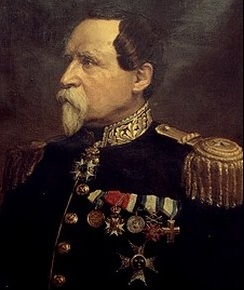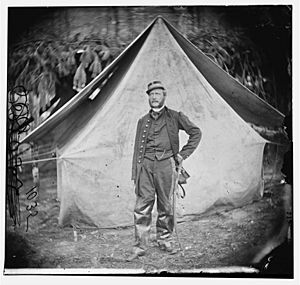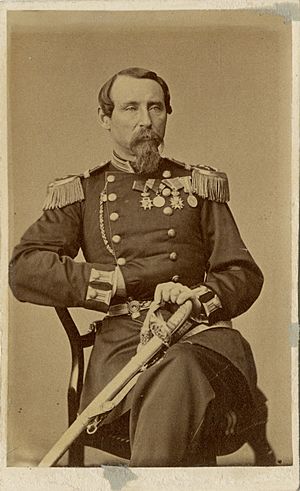Ernst von Vegesack facts for kids
Quick facts for kids
Ernst von Vegesack
|
|
|---|---|

Ernst von Vegesack as a Swedish major-general.
|
|
| Birth name | Ernst Mathias Peter von Vegesack |
| Born | June 18, 1820 Hemse, Sweden |
| Died | January 12, 1903 (aged 82) Stockholm, Sweden |
| Place of burial |
Norra begravningsplatsen, Sweden
|
| Allegiance | Sweden United States |
| Service/ |
Swedish Army United States Army Union Army |
| Years of service | 1840–1861, 1864–1888 (Sweden) 1861–1863 (USA) |
| Rank | Major General (Sweden) |
| Commands held | 20th New York Infantry Regiment Västerbotten Field Jäger Regiment Hälsinge Regiment Gotland National Conscription |
| Battles/wars | American Civil War |
| Awards | Medal of Honor För tapperhet i fält |
Ernst Mathias Peter von Vegesack (born June 18, 1820 – died January 12, 1903) was a brave Swedish Army officer. He volunteered to fight in the Union Army during the American Civil War. Later, he became a member of the parliament of Sweden.
After returning to Sweden, he was recognized for his service. He received the honorary rank of Brigadier General in the U.S. Army. In 1893, he was awarded the Medal of Honor for his courage. This special medal was given for his actions in the Battle of Gaines's Mill.
Contents
Early Career in Sweden
Ernst von Vegesack was born in Hemse, a town on the island of Gotland in Sweden. His father was a customs inspector and a captain.
In 1840, Ernst began his military career. He became a second lieutenant in the Gotland National Conscription. Two years later, he moved to the Dalarna Regiment and was promoted to lieutenant.
He also studied surveying, which is the science of measuring land. By 1846, he became a land surveyor in Dalarna County. He worked in this job until 1850. In 1852, he was sent to Saint Barthélemy. This was a Swedish island in the Caribbean Sea.
When he came back to Sweden, he was promoted to captain in 1857. He became a company commander at the Dalarna Regiment. He also helped oversee the building of the Gävle-Dala Railroad. This was one of Sweden's first long railroads.
Fighting in the American Civil War
When the American Civil War began in 1861, Ernst von Vegesack traveled to the United States. He decided to join the Union Army, which was fighting to keep the country united.
He started as a captain in the 58th Ohio Infantry. In the same year, he was promoted to major. He served on the staff of General John E. Wool. He was first stationed at Fort Monroe.
As an aide to General Joseph K. Mansfield, he helped in the attack on Newport News. In 1862, he left the army briefly. However, he soon rejoined and helped General George B. McClellan in the siege of Yorktown.
He fought in many important battles. These included Hanover Court House, Seven Pines, and Fair Oaks. He also fought at the Battle of Mechanicsville, Gaines's Mill, Savage's Station, and Malvern Hill.
Vegesack was then made a colonel. He led the 20th New York Infantry, which was known as the "Turner" regiment. He was given command of a brigade in the 6th Army Corps. He took part in the Second Battle of Bull Run. He also showed great bravery at the Battle of Antietam. Vegesack was also present at the Battle of Fredericksburg. In May 1863, his regiment was part of the Battle of Chancellorsville.
Ernst von Vegesack left the Union Army on June 1, 1863. He then returned to Sweden. For his brave service, he received Sweden's highest medal for courage. It was called the För tapperhet i fält (For valour in the field) in gold.
Later, in 1866, U.S. President Andrew Johnson nominated him for an honorary rank. He was given the rank of brigadier general of volunteers. The United States Senate confirmed this honor.
Return to Sweden and Later Life
After returning to Sweden, Vegesack continued his military career. In 1864, he was promoted to lieutenant colonel. He was given command of the Västerbotten Field Jäger Corps.
In 1868, he became a colonel. He was appointed commander of the Hälsinge Regiment. From 1874 to 1884, he was the military commander of his home island, Gotland. He also commanded the Gotland National Conscription.
In 1884, he was promoted to major general. He became the commander of Sweden's 5th Military District. Vegesack retired from the military in 1888.
From 1878 to 1887, Vegesack was also involved in politics. He served in the upper house of the Swedish parliament. He represented Gotland.
Ernst von Vegesack passed away on January 12, 1903, in Stockholm. He was buried at Norra begravningsplatsen in Stockholm.
Personal Life
In 1865, Ernst von Vegesack married Edla Amalia Sergel.
 | Emma Amos |
 | Edward Mitchell Bannister |
 | Larry D. Alexander |
 | Ernie Barnes |



